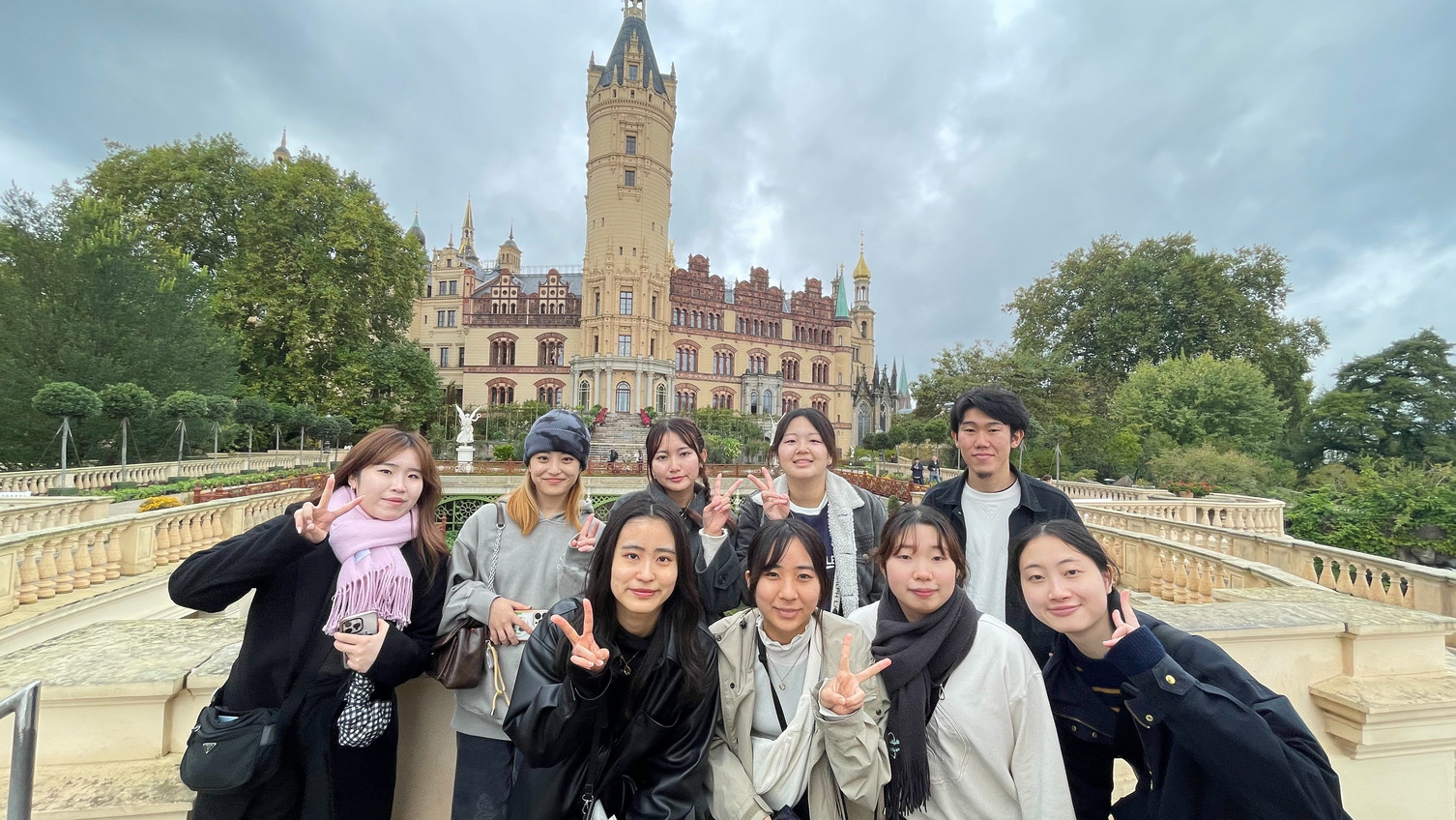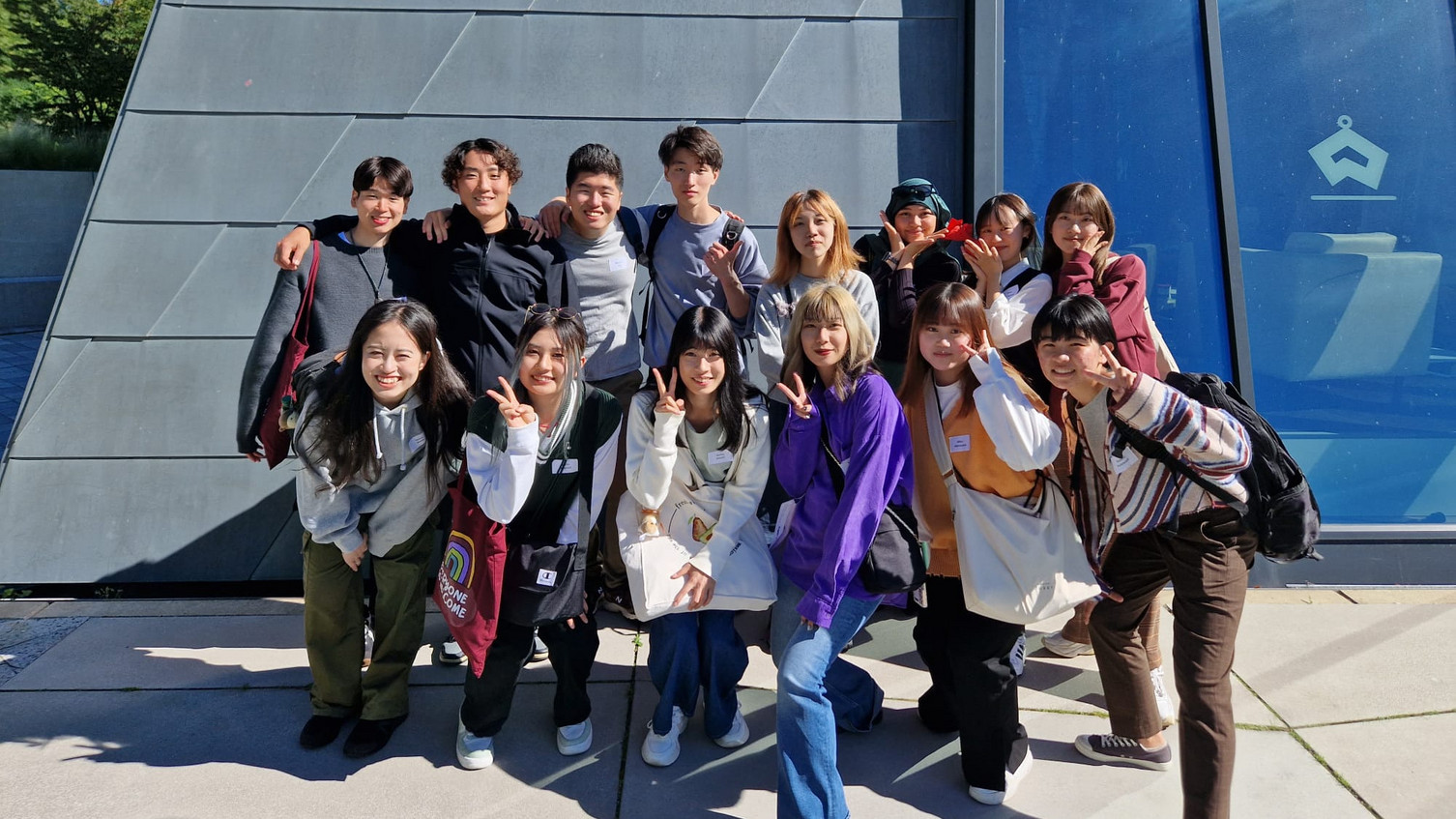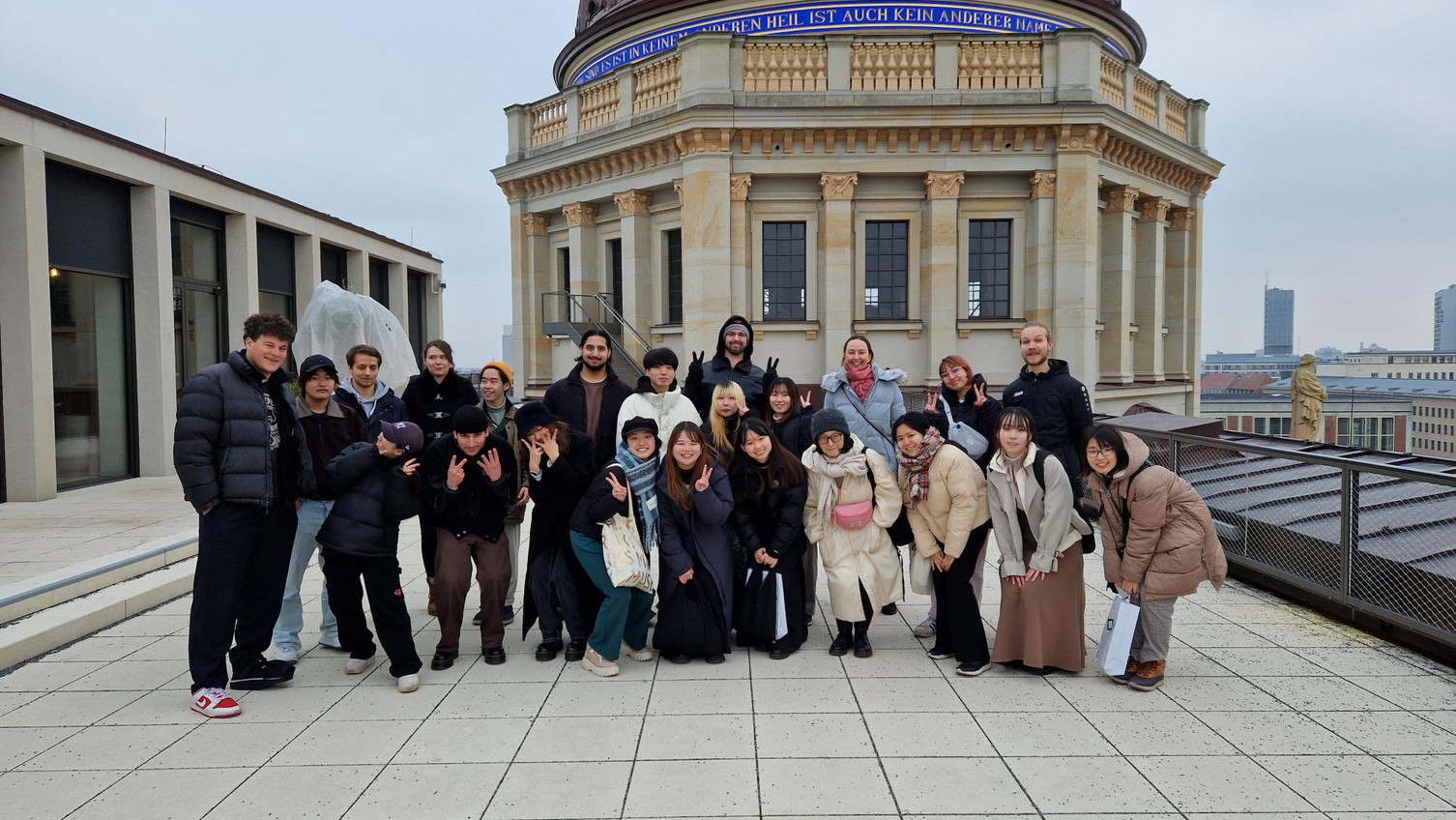Testimonials
Why did the Hōsei students of Intercultural Communication choose to spend a semester abroad at Leuphana? Which aspects of German culture, art or history did they find most interesting? What places and encounters made special memories? And what differences between Japan and Germany became apparent? In the following reports, participants from the last three years share their experiences with Hana van Loock.
Cultural Encounters and New Friendships
Over the past few months, Lüneburg became a second home to a group of Japanese students from Hōsei University in Tokyo. Between seminars, excursions, and new friendships, they experienced a semester full of new discoveries, challenges, and personal growth at Leuphana University. Hinako Saito and Erika Kawasaki share their impressions.
Early on, it became clear that university life in Germany and Japan differed in several ways. The Japanese students were particularly impressed by the active class participation of their German classmates and the lively, interactive, and critical discussions. The international environment at Leuphana, shaped by students from all over the world, made interactions especially exciting and diverse. Memorable experiences included courses such as Culture and Society in Germany, discussions about the history of the GDR, and visits to the Bergen-Belsen Memorial and the Volkswagen Autostadt. Although they found the German language classes to be challenging, the students also saw them as an opportunity to significantly improve their language skills.
However, their experience was not solely focused on academics. Many took the opportunity to engage in extracurricular activities or to travel. Hinako quickly found a sense of belonging in the university orchestra and experienced how music can connect people as a universal language. Erika tried out Pilates and badminton at the university sports center, appreciating both the physical and mental balance these activities provided. Both students enthusiastically shared how they made friends through shared interests. Traveling through Germany also created unforgettable moments. Whether it was attending a concert at the Berlin Philharmonic, visiting the St. Thomas Church in Leipzig, exploring Cologne’s historic old town, or touring countless museums in various cities – the diversity of architecture, history, and culture left a lasting impression.A particularly significant experience was living in a shared apartment – a completely new reality for the students. At first, the language barrier posed a challenge, but soon, they found the communal living experience enriching. Spontaneous kitchen conversations and shared activities quickly led to friendships, some of which will last beyond their stay. They also met many new people through university programs and meeting spots, such as the Buddy Program, the Trafos, or the Klippo.
Throughout their stay, the students learned a lot about Germany and its culture. They were impressed by the helpfulness and openness they encountered in daily life, whether in student dormitories or interactions with classmates. One striking cultural difference was the ease of communication – even between strangers. At first, it seemed unfamiliar to greet strangers or engage in casual conversations in public transportation, but they soon came to appreciate it. Germany’s strong environmental awareness, particularly recycling and waste reduction, also made a lasting impression.
Their time in Germany also led to a new perspective on their own culture. While they came to appreciate Japanese hospitality (Omotenashi) and the punctuality of public transportation even more, they also recognized that social norms in Japan are often more restrictive - allowing less room for individuality. Both students resolved to be more mindful of intercultural exchange upon their return and to continue developing their language skills.
In many ways, their expectations for the exchange semester were exceeded. Although they did use English instead of German more often in everyday life, they significantly improved their listening comprehension and overall language abilities. What they will miss most is the shared apartment life and the close-knit community they formed. The students could not have imagined how deeply this experience would shape them. The idea of returning to live with their families in Japan feels difficult for some.
Ultimately, Hinako and Erika reflected on how their stay also changed their personal outlook. They became more open-minded and tolerant, realizing the importance of engaging in daily conversations with others.
What remains is the memory of an unforgettable time filled with encounters, discoveries, and personal development. Germany was not just a place of learning but a temporary home – an experience that will have a lasting impact far beyond their studies.
The interview was led by Hana van Loock
Which degree program are you studying at your home university?
At our home university, Hosei University in Tokyo, we study Intercultural Communication. Within our degree program, we can choose from various languages, including Chinese, Korean, Spanish, French and also German as a third foreign language. In addition to the language options, we can choose to specialize in art, cultural studies or literature. In the fourth semester, all students spend a semester abroad in a country where their chosen language is spoken.
Why did you decide to study abroad in Germany?
Reina: I had already been to Canada and now I wanted to experience a country where English is not the official language in order to learn another foreign language.
Kasumi: I am fascinated by Eastern European cultures and the history of the GDR. I became interested after reading the book "Eve of the Revolution" by Suga Shinobu. This book is about a Japanese man who studies in the GDR.
I had the opportunity to visit Berlin and Dresden during my semester abroad.
Are there any aspects of German culture, art or history that you found particularly interesting during your semester abroad?
Kasumi: I visited a lot of museums, and I was particularly interested in paintings depicting Christianity, as this is not common in Japan.
Reina: I have a passion for opera and ballet. In January, as part of our Study Abroad program, we attended a performance of "Swan Lake" together at the Hamburg State Opera. I was surprised by the variety of performance styles and by the fact that many young people in Germany also go to visit the opera.
What surprised you the most during your semester abroad? Did you experience any challenges?
Kasumi: I remember being very surprised at the beginning that most shops in Germany are closed on Sundays. It's very different in Japan, where Sunday is the busiest day of the week.
Reina: As you may know, trains in Japan run very punctually. We had expected the same from Germany, as Germans are known abroad for their punctuality. In reality, we had to constantly check the display board at Lüneburg station, as the departure times of the trains were constantly changing. Unfortunately, there were many train cancellations and delays, partly due to the GDL strike. We therefore often booked the Flixbus for our trips.
Was there perhaps once a funny misunderstanding?
Kasumi: Yes, I once got into the car on the wrong side by mistake. In Japan there is left-hand traffic!
Reina: I sometimes wondered what meaning an emoji could have, because they sometimes look completely different in Japan and Germany and can have different meanings.
You came from the metropolis of Tokyo to the – in comparison - small city of Lüneburg. What was that like for you?
Kasumi: We quickly settled in here. We both originally come from smaller cities and only moved to Tokyo to study. I particularly liked the small houses in the medieval town center, especially at Christmas time.
Reina: I think it's great that so many people in Lüneburg are traveling by bike. In September, we did a cycling workshop with the university sports center so that we could use the Lüneburg city bike called “Stadtrad” ourselves. It's free for Leuphana students for 60 minutes per trip.
Do you have any recommendations for future students from Hosei University on what they can do at Leuphana in their free time?
Kasumi: I really enjoyed the language tandem program. I was able to make contact with a native German speaker and try out my oral German skills in our meetings.
Reina: I would recommend taking part in a university sports course! There is a wide range of courses on offer - I opted for a dancing class. The instructor was very nice and explained things in English as well as German. I felt included and had a very enjoyable experience.
Dear Kasumi, dear Reina, thank you very much for the interview!
The interview was led by Hendrik Janssen
Ryo Azuma and Hiroto Fukushima talk about their impressions.
"Here in Germany, everything works a little differently than in Japan," think Ryo Azuma and Hiroto Fukushima. They are sitting in "Klippo" in the central building, among many other students who meet here to chat, study or drink a coffee in peace. The two 21-year-olds talk about their experiences and impressions as Japanese study abroad program students who have traveled from vibrant Tokyo to tranquil Lüneburg for six months. How did this come about? For Ryo and Hiroto, a semester abroad is part of their studies. Both are studying Intercultural Communication at Hōsei University in Japan. Through its cooperation with Leuphana, 13 Japanese students have been in Lüneburg for a semester since last fall. The study abroad program has been in place since 2019, and after a pandemic-related break, students from Tokyo were finally able to come to Lüneburg again at the end of 2022. One advantage of the town: "Here in the north, there is hardly any German dialect, which makes it easier for us to learn the language," Ryo and Hiroto explain. Both are currently attending the B1 German course at Leuphana.
For Hiroto Fukushima it is the first time in Germany, Ryo Azuma was already here once during his school years. He visited Germany then as part of a program in which students had the opportunity to educate the world about the Fukushima nuclear disaster. That exchange was four years ago. "I was born in the Fukushima prefactor, and during the exchange I talked to other students about my experiences," the now 21-year-old says. Ryo is in his third year of study and thus a "junior" at his university, while Hiroto is in his second year and thus considered a "sophomore." The system at Japanese universities is more like the U.S., both explain. In addition to the language course, the current semester's program for the Japanese students included seminars on German culture and society, as well as on the reception of Japanese art and culture in Germany. Additionally, the students had the opportunity to freely choose further modules in the complementary studies.
In the past six months, Ryo and Hiroto have experienced a lot - with apl. Prof. Werner Preuß the group has followed in the footsteps of Lüneburg's history. A seminar in the complementary studies, which is is led by Dr. Annett Röper-Steinhauer, involved both students from Japan and regular students from Leuphana. Together, the group visited the Museum für Kunst und Gewerbe in Hamburg and held a joint tea ceremony there, and toured the Humboldt Forum Berlin. As part of the language and orientation program, the Japanese students spent an entire weekend in the German capital, where among other places, they visited the Bundestag and the Jewish Museum. With Hendrik Janssen, who studies at Leuphana and works as a student assistant in the International Office, the group took a trip to Bremen to the Kunsthalle and the medieval Christmas market. He was there to support the program students throughout their entire stay.
Hiroto and Ryo learned a lot in Lüneburg, especially about themselves: "I love traveling and would like to see a lot of the world in the future," says Ryo. Nevertheless, he has determined that he would like to live and work in Japan in the long term. For Hiroto, it's a little different: He would like to do another master's degree after his bachelor's degree - abroad. "It's not my first semester abroad; I've already been to Norway for half a year during school," he says. "In Japan, most people start working right after they finish their bachelor's degree, but I'd like to do another degree and I find traveling broadens my perspective. Therefore, I hope to get the opportunity to study abroad."
The interview was led by Paula Muche and Hendrik Janssen



